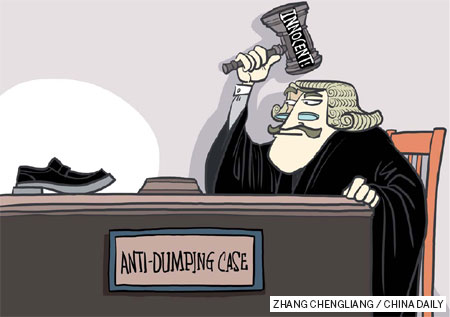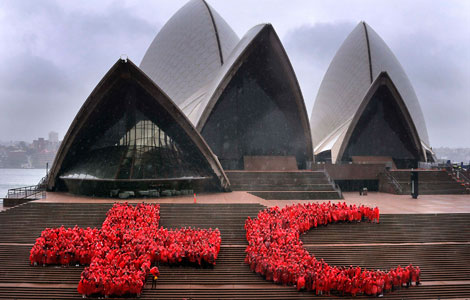


But timing of EU court's ruling leaves many out of pocket
A Chinese firm's vindication in a legal dispute over European trade laws has been six years in the making, nevertheless it is a rare court win that is worth heartily celebrating.
Aokang Group Ltd won its appeal last month before the European Court of Justice, the EU's highest judicial authority for interpreting the EU Treaty and all secondary laws of the EU, including those on anti-dumping.
Aokang and three other Chinese footwear producers first raised the challenge in the lower EU Court of First Instance, now called the General Court. It rejected all the legal arguments put on their behalf, but Aokang decided to take the matter further and have it looked at by the European Court of Justice.
The ECJ cannot review factual findings of the lower court, but it has the power to review the adequacy of the General Court's legal reasoning. In only rare international trade cases such as Aokang's is the judgment of the General Court overturned.
For Aokang's appeal to the ECJ, it was decided to focus on two fundamental arguments. An appeal against an EU anti-dumping regulation can only benefit the company applicant, and indirectly its EU importers who pay the anti-dumping duty. However, both arguments for Aokang entailed fundamental legal issues that could have a wider legal bearing that could help other Chinese companies and industries affected by EU anti-dumping investigations.
The first argument raised with the ECJ concerned the conditions under which the European Commission, in essence both the investigator and judge in an anti-dumping investigation, must review claims for market-economy treatment by cooperating Chinese producers. In most dumping cases, securing market-economy treatment is crucial for a much lower, anti-dumping duty to be imposed, or none at all, which can then give that producer a strong competitive advantage.
Aokang's second argument focused on whether its rights of defense were violated in the final part of the investigation when the commission disclosed successive and quite different "definitive" measures. A ruling on Aokang's second argument could also have had huge implications, but the ECJ's judgment was restricted to the arguments on market-economy treatment - a great victory for Aokang nonetheless.
The General Court had ruled that whenever the commission conducts an anti-dumping investigation of Chinese exports and decides at the start to examine in detail a small sample group of companies and levy individual anti-dumping duties on them alone, the commission does not have to examine the market-economy treatment claims of all the other cooperating producers who applied for the treatment. Aokang was in exactly that position: it applied for market-economy-treatment status and was not part of the sample group, so the commission never examined its claim.
We argued to the ECJ that the General Court's reasoning that linked the commission's "sampling procedure" to its non-examination of Aokang's claim for market-economy treatment was legally deficient. Indeed, we demonstrated that the purpose and content of the respective market-economy treatment and sampling provisions of the EU's anti-dumping regulation are entirely different.
The ECJ's judgment has now confirmed that the content and purpose are different, thus ruling that the commission was legally obliged in these circumstances to examine Aokang's status on market-economy treatment. So that is a great victory for Aokang, which we believe would have secured the market economy treatment if it had been properly examined. But it is also a victory for producers in other large investigations that may deserve market-economy treatment but that are not finally selected by the commission for a sample group. However, the significance of the Aokang victory goes far beyond this.
The ECJ's Aokang judgment is also of special legal interest because in oral arguments before the court the EU Council and Commission said the court should reject Aokang's arguments because of the potential negative fiscal impact on the EU and of member states' budgets. The council and the commission said customs authorities of the member states, which now face severe economic problems, collected a total of 490 million euros in anti-dumping duties on footwear and that this might have to be repaid to importers if the court did not reject Aokang's arguments - and thus also overturn an earlier ruling.
If the court rejected that argument, the council and the commission said, it should at least somehow limit the "temporal effects" of the judgment so importers could not seek refunds of their wrongfully paid anti-dumping duties going all the way back to the start of the anti-dumping measure.
The ECJ has fortunately rejected such desperate and improper claims. As we counter-argued, fiscal impact should never enter the court's thinking when interpreting the anti-dumping regulation. Further, even though such arguments were totally outside the proper pleadings of the council and the commission, the ECJ's judgment has expressly rejected any limitation on the retroactive effect of its judgment, thus fully defeating the council's and the commission's extra and special pleading.
However, unfortunately the winning judgment from the ECJ has arrived a very long time after the contested anti-dumping measure on footwear was imposed, in October 2006. The legal challenge for Aokang was filed in the EU's General Court in December that year, and the General Court's negative judgment was issued only in March 2010. The appeal to overturn the General Court's judgment was filed with the ECJ in May 2010, and its judgment was delivered a month ago. Under EU customs law, customs refund claims are limited to amounts paid within three years from when the duties were communicated.
This means that whenever the EU courts take such a long time to finally determine that anti-dumping duties have been imposed illegally, the importers may not, under current rules, be able to claim back the totality of the illegal anti-dumping duties paid over the years of deliberations by the courts.
Such an outcome from another dumping case was confirmed in June, so we have yet another serious legal issue to address: whether the EU provides an effective judicial remedy to Chinese parties affected by the illegal actions of the EU's anti-dumping authority. This issue is of relevance to all parties wrongly affected by illegal EU anti-dumping measures that the EU courts do not overturn, or by the council pursuant to a ruling of the World Trade Organization, until long after the illegal anti-dumping measure was imposed.
Finally, all Chinese producers affected by EU anti-dumping investigations, even the continuing investigations of Chinese exports including bicycles and solar panels, must take note of the commission's current proposal to amend the market-economy treatment procedures under the EU's anti-dumping regulation. The proposal is expressly aimed at overturning the reasoning of the ECJ on market-economy treatment in both the Aokang case and an earlier case that is detailed here. What the commission failed to achieve before the ECJ it now tries by proposing law change. The EU is of course entitled to amend anti-dumping regulations on how it deals with the highly sensitive issue of market-economy treatment, but we believe its current proposal raises major legal questions.
The Aokang judgment has been an important success, and the company is to be admired for its determination, despite setbacks, to see the legal process through to the EU's highest court.
However, efforts should now be made to protect and broaden the success on market-economy treatment in the Aokang judgment, to the many producers caught up in current and coming EU anti-dumping investigations.
The author is an international trade partner of Steptoe & Johnson LLP, Brussels, which represented Aokang. The views do not necessarily reflect those of China Daily.
(China Daily 12/07/2012 page10)







